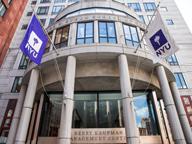Faculty News
—
Professor Christopher Conlon's joint research on common ownership is featured
—

Exceprt from the Harvard Law blog -- "Our new working paper, Common Ownership in America: 1980–2017 provides a new analytical framework for this debate, by comprehensively analyzing the theoretical and empirical implications of the common ownership hypothesis among all S&P 500 firms from 1980–2017. Our paper identifies why common ownership presents such a tremendous challenge to markets and regulators if prevailing hypotheses are true, but we also identify important data problems, misconceptions and erroneous assumptions that call into question the reliability of existing research."
Faculty News
—

Exceprt from the Harvard Law blog -- "Our new working paper, Common Ownership in America: 1980–2017 provides a new analytical framework for this debate, by comprehensively analyzing the theoretical and empirical implications of the common ownership hypothesis among all S&P 500 firms from 1980–2017. Our paper identifies why common ownership presents such a tremendous challenge to markets and regulators if prevailing hypotheses are true, but we also identify important data problems, misconceptions and erroneous assumptions that call into question the reliability of existing research."




















